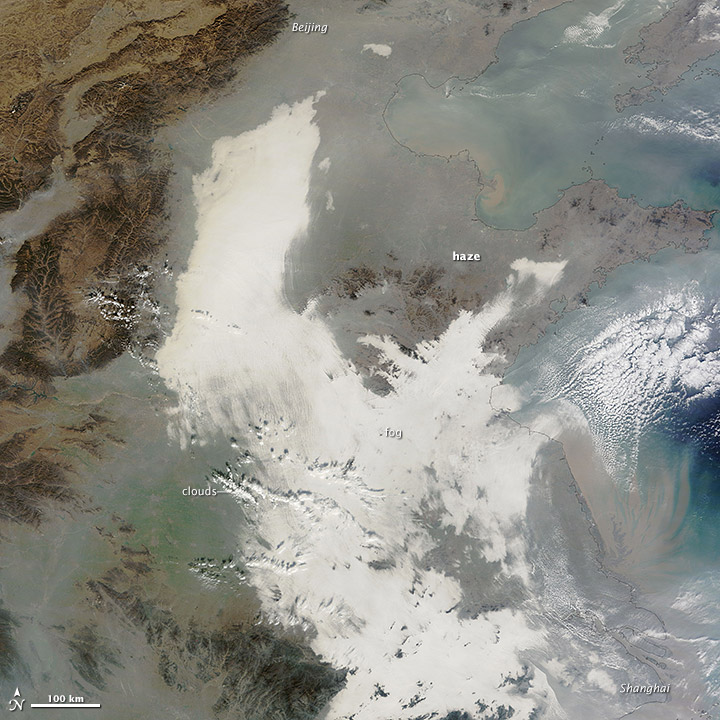- 這個話題是空的。
- 作者文章
- 2006年3月12日 11:20 下午 #3306引用:中國最高環保官員週六警告說,中國必須大幅改善環境保護,否則中國可能會面臨災難,二十年來的高速成長已經污染了空氣、水和土壤。國家環保總局局長表示,中國21,000家化工企業中有一半以上位於長江和黃河附近,這些河流是數千萬人的飲用水源,發生事故可能會導致「災難性後果」。
「事實證明,以犧牲環境為代價的繁榮是非常膚淺的、非常軟弱的。」週生賢在中國人大年會期間的新聞發布會上表示。 “這只是延緩災難的發生。”
中國的城市是世界上霧霾最嚴重的城市之一,政府表示,中國的主要河流受到嚴重污染,導致數億人沒有足夠的清潔飲用水。全國各地爆發了針對農民的抗議活動';有關工廠排放不受控制的投訴正在毀壞農作物並污染水源…
2006年4月19日 上午 7:41 #4160引用:新華社北京4月18日電 中國國務院總理溫家寶在全國環境保護工作會議上表示,“外面已經十多天沙塵天氣了,我們不能閉門討論。”「除了氣候因素外,這也反映出我們面臨嚴峻的環境形勢,」溫家寶在談到北京被黃塵籠罩時說。
溫家寶在周一至週二舉行的會議上發表演說時表示,要高度警惕一些地區環境污染和生態惡化問題,並將環境保護放在國家現代化建設的優先位置。
他說,剛結束的第十個五年計劃(2000-2005年)的環境保護主要目標沒有如期實現,並且出現了新的問題。
中國制定了2000年至2005年二氧化硫排放量減少10%的目標。據國家環保總署 (SEPA) 稱,它設定了相同的減少一氧化碳排放量的目標,但僅實現了 2% 的削減。
溫家寶指出:“中國嚴重的環境污染可歸咎於缺乏認識、規劃不足和法律框架薄弱。”
…
總理提出了當前和未來環境保護的四項重點工作。包括加強節水、治理大氣及土壤污染、加強國民生態保護、調整經濟結構、振興環保技術與環保產業等。去年11月松花江洩漏事故威脅中國東北黑龍江省省會哈爾濱市400萬居民的供水後,國家環保總署報告了在兩個半月內發生的其他45起污染事故。
政府列出的另一起事故是華南廣東省北江沿岸的鎘洩漏事件,也威脅了當地的飲用水和農業用水供應。
其他重大水污染事件包括東北渾河、湖南湘江化學物質外洩、河南黃河柴油外洩、江西贛江溢油等。
溫家寶週一要求地方政府每六個月發布一次能源消耗和污染物排放信息,制定控制排放計劃並加強對建設項目的環境評估。
溫家寶表示,要落實資源開發的保護政策,建立法律和監督體系,並敦促地方投入更多資金,提高民眾的環境保護意識。
2006年4月21日 10:08 下午 #4161引用:一位高級官員本週表示,日益惡化的環境問題正在威脅中國的社會穩定,因為憤憤不平的居民訴諸抗議來表達自己的聲音。國家環保總署局長週生賢表示,嚴重污染去年引發了至少51萬起公眾糾紛,「對社會穩定造成了巨大威脅」。新華社引述他的話說,與環境議題有關的抗議活動等「群體性事件」以平均每年29%的速度上升。新華社引述周永康週三在北京舉行的全國環境保護大會上的話說:“如果環境保護繼續落後於經濟增長,(污染)將會變得更加嚴重,並且更加難以控制。” 「地方官員……不符合要求的人將會因忽視法律而付出代價,」周先生警告。他的言論凸顯了中國高級官員對日益頻繁的環境災難日益感到的不安……。環境問題損害社會穩定
5 2006年6月9日 下午 9:54 #4162有關中國環境的更多悲觀消息
引用:一位高級官員週一表示,中國的污染問題每年造成的損失超過2000億美元,他呼籲為基層團體提供更好的法律保護,以便他們可以幫助政府清理環境。環保署副局長朱光耀估計,中國環境破壞導致政府損失約佔國內生產毛額的10%。 2005年中國GDP為$2.26兆美元。
他表示,儘管政府做出了努力,中國的環境狀況不但沒有改善,反而在惡化,「不容樂觀」。
朱表示,環保非政府組織可以在「推動或推動政府」解決環境問題方面發揮重要作用。
他承認,有些地方官員沒有很好地執行中央政府的指導方針。
朱表示,執行中央政府的指導方針對地方官員來說也是一個挑戰,他們習慣以成長高於一切來評判他們,並擔心更嚴格的環境控制對經濟的影響。 ……
另見人民網:
全文:中國環境保護(1996-2005)2006年7月31日 11:10 下午 #4163幾年前,我寫過一篇關於台灣酸雨的文章;發現島上至少有部分空氣污染可以追溯到上海地區。在這裡,調查結果顯示來自中國的污染傳播得更遠——這並不是中國獨有的,例如北極熊體內的多氯聯苯等。
引用:美聯社撰稿人特倫斯·謝(TERENCE CHEA) 加州塔馬爾佩斯山州立公園(美聯社)——在俯瞰太平洋的山頂上,史蒂文·克里夫(Steven Cliff) 收集了千里之外正在發生的工業革命的證據。克里夫在舊金山北部的空氣監測站收集到的微小空氣顆粒,是從中國和其他亞洲國家的燃煤發電廠、冶煉廠、沙塵暴和柴油卡車飄過海洋的。研究人員表示,中國經濟高速成長對環境的影響遠遠超出了其國界。他們擔心,隨著中國消耗更多的化石燃料來滿足其能源需求旺盛的經濟,美國可能會看到跨太平洋污染急劇增加,這可能會影響人類健康,惡化空氣品質並改變氣候模式。 ……美國環保署估計,在某些日子裡,洛杉磯上空近 25% 的顆粒物可以追溯到中國。一些專家預測,有一天,中國可能佔加州空氣污染總量的三分之一。 ……自然資源保護委員會中國清潔能源計畫負責人芭芭拉·菲納莫爾表示,如果目前的趨勢持續下去,中國將在未來十年超過美國,成為世界上最大的溫室氣體排放國。該計畫正在幫助中國提高能源效率。菲納莫爾表示:“中國驚人的經濟成長是一顆環境定時炸彈,除非引爆,否則無論其他國家取得怎樣的進步,整個地球都將受到震動。”就連中國環境官員也警告說,如果中國不限制能源使用和排放,未來15年污染水平可能會翻兩番。北京計畫在未來五年內花費$1620億元用於環境治理,但中國的污染問題規模龐大。 ……中國自然資源保護委員會的菲納莫爾表示,中國面臨的環境挑戰令人畏懼,但該國正在採取行動減少能源使用和空氣污染。她說,北京製定了雄心勃勃的目標,以提高能源效率、燃油經濟性標準以及風能和太陽能等再生能源的使用。菲納莫爾說:“中國有巨大的機會來減少空氣中的污染量。”中國的空氣污染到達美國上空
2006年9月15日 11:10 上午 #4164引用:國家環保總署終於找到了導致甘肅省179名村民住院治療的血液中毒的罪魁禍首。輝縣受害村附近的鉛冶煉廠已被吊銷生產許可證,國家環保總署已承諾將嚴懲肇事者和當地監管部門。
將對工廠周圍受污染的土壤進行進一步調查,衛生部已會同當地衛生部門對中毒村民進行治療。
這家工廠和村民的遭遇,是東部大部分地區以犧牲環境為代價的經濟成長模式的重演。
這表明,西部地區的發展,至少在某些地方,同樣面臨環境與經濟成長之間的必然選擇。
…
慘痛的教訓是,村民和決策者太被眼前的利益蒙蔽了雙眼,無法對環境污染的影響有長遠的認知。一位當地官員表示,該縣吸引的大部分工業項目都存在環境問題。要把高科技計畫吸引到這樣一個貧困縣幾乎是不可能的。
看來,西部的那些貧困地區必須在清潔的環境和經濟成長之間做出選擇。他們還有別的出路嗎?西部地區的發展需要回答這個問題。
10 2006年11月11日 8:46 上午 #4165引用:一份發布的報告描繪了中國「日益惡化的環境狀況」的可怕景象,並提出了 51 項可以實施的舉措來改善這種狀況。這份經中國政府批准由經濟合作暨發展組織發布的報告稱,中國在防止土地、水和空氣污染方面做得還不夠。
報告摘要 (pdf) 可在以下位置取得:
經合組織 > 按國家分類的資訊 > 中國 > 國家調查/評論/指南14 2006 年 11 月 5:11 下午 #4166已經過去好幾年了 壞地球 Vaclav Smil 於 20 世紀 80 年代出版。描繪了中國環境的嚴峻景象。當時,中國官員表示斯米爾的說法是錯誤的。但此後,官方承認環境不斷惡化。現在,正如這篇文章所顯示的,事情越來越嚴重:儘管中國經濟蓬勃發展,但其環境卻在走下坡路。 (是的,有一些亮點。)
來自剛剛發表的文章 中國日報:
環境監管機構負責人週末表示,該國的環境狀況已達到「臨界點」。
「越來越多的環境問題開始出現,」國家環保總局局長週生賢在中國環境與發展國際合作委員會(國合會)年會上表示。
「一些地方環境問題影響人民身體健康和社會穩定;損害了我們的國際形象。
週指出,中國一半以上的河流受到嚴重污染,約三分之一的領土受到酸雨影響。
環境狀況處於“關鍵時刻”此外,有跡象表明,中國最近因其對國內外環境影響的批評而受到刺痛:
一家知名智庫發布的報告稱,西方媒體忽視了中國對外國環境的正面影響。中國環境與發展國際合作委員會(國合會)特別工作小組在週末的年會上提交了《中國環境與發展回顧與展望》報告。該工作小組由來自國內外全球環境及相關領域的頂尖專家組成。
報告稱,「過度強調環境負外部性將限制中國的發展權」。
綠色影響力“被媒體忽視”2007年1月14日 11:09 上午 #4167英國《獨立報》的商業評論文章涵蓋了中國的污染問題。包括:
引用:環保遊說者長期以來一直譴責美國人是地球上的“骯髒的富人”,但現在是我們將注意力轉向東方的時候了。您可能會驚訝地發現,中國去年的二氧化碳排放量比整個歐洲還要多,以目前的排放量,兩年內將超過美國,成為地球主要污染國。目前,全球污染最嚴重的20個城市中有16個在中國。
…
目前,近 80% 的河水被認為受到污染。當最近一次拯救長江海豚(一種美麗的生物,在中國曾被視為神)的探險隊幾週前報告說為時已晚時,這是極具象徵意義的。沒有找到。…
來自中國的污染雲席捲了韓國和日本,甚至被認為正在到達美國。如果從太空看,巨大的硫磺雲遮蓋了北京和上海在地球上應有的位置。當我抵達中國時,一位上海鋼鐵貿易商迎接了我,並說「歡迎來到未來」。他笑容滿面,展現出推動中國前進的無限樂觀精神。但如果這個未來是有毒的水和充滿煙霧的天空——那就忘記它。這是行不通的。
醒來聞聞碳味。
– 問題是,國家政府似乎已經意識到中國的污染問題,儘管為時已晚,但還沒有足夠的力量來解決問題,包括地方官員往往貪婪和腐敗,顯然很樂意忽視污染,而美元流入。
即使在香港,行政長官曾蔭權也聲稱空氣污染並不是重大的健康問題;香港的空氣不如北極的空氣乾淨,但他聲稱也不算太糟。
當我寫這篇文章時,由於冷鋒席捲而來的嚴重煙霧,香港的能見度只有幾百公尺。6 2007年7月6日 下午 6:11 #4168多年來,我一直認為中國將成為經歷大規模生態滅絕的最大國家。也許問題並沒有那麼嚴重,但最近的一些報導表明,許多地方的環境都非常緊張,甚至處於臨界點。
例如,近期三大湖泊出現藻華現象;一兩次,導致人們供水出現嚴重問題。總之,對漁業等造成損害。英國《金融時報》對即將發布的世界銀行報告進行了報道,並稱中國官員一直主張不公佈一些數據,例如每年有75萬人因環境問題過早死亡。
今天的南華早報,這些報導被中國否認,但世界銀行拒絕發表評論。摘自 7 月 2 日英國《金融時報》:
引用:由於擔心過早死亡的調查結果可能引發“社會動盪”,北京方面策劃刪除了世界銀行關於中國污染的報告中近三分之一的內容。這份多年來與中國政府部門合作撰寫的報告發現,中國每年約有75萬人過早死亡,主要是因為大城市的空氣污染。
…
研究小組的顧問表示,各部會告訴他們這些資訊過於敏感,其中包括顯示全國哪些地區死亡人數最多的詳細地圖。「世界銀行被告知不能公佈這項資訊。該研究的一位顧問告訴英國《金融時報》,它太敏感了,可能會引起社會動盪。
根據世界銀行先前的研究,全球20個污染最嚴重的城市中有16個在中國。
…
該報告缺少該研究項目的調查結果,即中國城市的高空氣污染水平每年導致 350,000-400,000 人過早死亡。據顧問稱,每年還有 30 萬人因暴露在室內空氣品質差而過早死亡,但報告中幾乎沒有討論這個問題,因為它不屬於資助這項研究的中國部會的管轄範圍。另有 6 萬多人過早死亡是由於水質不佳(主要發生在農村),導致嚴重腹瀉、胃癌、肝癌和膀胱癌。
該研究計畫的顧問表示,世界銀行「不情願」地從已發表的報告中刪除了死亡率資訊。
每年75萬人因中國污染而死亡
英國《金融時報》第二天的報導包括:引用:污染城市的居民不需要世界銀行告訴他們空氣骯髒。他們每天都會呼吸這些東西。但中國官員的緊張是有道理的。近年來,隨著中國公民受到更好的教育並且更有力地捍衛自己的權利,農村和城市的環境抗議活動激增。在廈門,憤怒的居民擱置了建造一座被視為致命污染源的石化廠的計畫。然而,對於世界銀行報告中的此類嚴峻消息,正確的反應不是壓制真相,而是解決根本問題。例如,減少燃煤發電站的排放既不像企業及其勾結的省政府所假裝的那麼昂貴,也不像那麼困難。
此外,中國可以將國內城市空氣污染危機與解決國際氣候變遷問題連結起來。當地空氣污染物和全球暖化的主要氣體碳的噴出往往是同時發生的。這同樣適用於工廠現代化以避免任何一種排放。許多外國公司渴望為這些清理項目提供資金,以換取國內重視的碳信用額。同時,這些可以幫助中國解決當地的空氣污染問題。
只有中國領導人克服對事實的恐懼並開始講真話,上述所有事情才會發生。他們可能會發現這比他們想像的更容易,而且肯定會產生更好的結果。
貼文編輯:Martin,發佈於:2007/07/06 11:47
2007年8月28日 下午 2:15 #4169《紐約時報》發表的一篇篇幅宏大、有力的文章——「一系列文章和多媒體研究中國嚴重污染危機造成的人員傷亡、全球影響和政治挑戰」的開頭。
包括:
引用:歷史上,任何一個國家在成為主要工業強國時都會留下環境破壞的痕跡,而這種破壞可能需要幾十年的時間和大量公共財富才能消除。但正如中國崛起為經濟強國的速度和規模在歷史上沒有明顯的可比性一樣,它的污染問題也打破了所有先例。目前,環境惡化如此嚴重,在國內和國際上產生瞭如此嚴重的影響,污染不僅給中國公眾帶來了重大的長期負擔,而且對執政的共產黨構成了嚴峻的政治挑戰。目前尚不清楚中國能否控制自己的經濟霸主。
公共衛生狀況岌岌可危。衛生部表示,污染已使癌症成為中國的首要死因。每年,光是環境空氣污染就導致數十萬人死亡。近 5 億人無法取得安全飲用水。
中國的城市似乎常被一層有毒的灰色裹屍布包裹著。該國 5.6 億城市居民中只有 1% 呼吸歐盟認為安全的空氣。北京正在瘋狂地尋找一個神奇的公式,即氣象救星,為2008年奧運淨化天空。
在一些國家可能被視為災難性的環境問題在中國卻顯得司空見慣:工業城市人們很少見到陽光;兒童因鉛中毒或其他類型的當地污染而死亡或生病;海岸線被藻類紅潮淹沒,大片海洋不再維持海洋生物。
中國正因自己的成功而窒息。
…
自2002年胡錦濤就任中共總書記、第二年春天溫家寶就任總理以來,中國領導階層已經確定了一致的主題。經濟必須以更永續、更少泡沫的速度成長。環境破壞已達到令人無法容忍的程度。忽視這些原則的官員將被追究責任。五年後,情況似乎很明顯,這些高級領導人要么太膽怯而不敢執行他們的命令,要么他們所領導的快速增長的政治文化太根深蒂固而無法聽從他們的命令。
今年第二季度,經濟以 11.9% 的驚人速度擴張,為十年來最快。國家驅動的投資項目、國家支持的重工業和蓬勃發展的出口部門引領了這一趨勢。中國的煤炭消耗量比前一年增加了 18%。
中國的威權體制一再證明其有能力壓制對共產黨統治的政治威脅。但許多專家和一些政府官員表示,中國未能實現其所宣稱的平衡經濟成長和環境保護的目標,這表明該國的環境問題至少部分是系統性的。換句話說,如果沒有政治變革,中國就無法走向綠色。
…隨著中國的咆哮,污染達到致命的極限
系列於:
成長窒息2007年9月14日 7:51 上午 #4170另一篇長篇、內容豐富的文章——在美國外交關係委員會網站上。
概括:引用:中國的環境問題日益嚴重,並迅速成為世界上主要的污染國之一。情況持續惡化,因為即使北京製定了雄心勃勃的環境保護目標,地方官員通常也會忽視這些目標,而寧願集中精力進一步促進經濟成長。真正改善中國的環境需要革命性的自下而上的政治和經濟改革。伊莉莎白‧C‧經濟 (Elizabeth C. Economy) 是美國外交關係委員會 CV Starr 高級研究員兼亞洲研究主任,也是《黑河:中國未來面臨的環境挑戰》一書的作者。
包括:
引用:中國已成為空氣和水污染以及土地退化問題的世界領導者,也是非法木材貿易、海洋污染和氣候變遷等一些世界上最棘手的全球環境問題的最大罪魁禍首。隨著中國污染問題的加劇,其經濟、公共衛生、社會穩定和國際聲譽面臨的風險也隨之增加。正如中國國家環境保護總局 (SEPA) 副局長潘岳在 2005 年警告的那樣,“由於環境已跟不上步伐,[經濟]奇蹟很快就會結束。”
…
全球20個污染最嚴重的城市中有16個位於中國,其中最嚴重的四個城市位於中國東北部煤炭資源豐富的山西省。中國90%的二氧化硫排放量和50%的粒狀物排放量是由煤炭使用所造成的。
…
然而,煤炭的使用可能很快就會成為中國空氣品質問題中最不重要的一個。交通運輸的蓬勃發展給中國的空氣品質帶來了越來越大的挑戰。
…
戈壁沙漠現在吞沒了中國西部和北部的大部分地區,每年擴大約 1,900 平方英里;一些報導稱,儘管北京積極進行植樹造林工作,但全國四分之一的面積現在仍是沙漠。
…
正如全國人大顧問劉全峰所說,“流入渤海的河流幾乎沒有一條是乾淨的。”中國每年向渤海排放約28億噸污染水,目前渤海底部淤泥中的重金屬含量高達中國官方安全標準的2,000倍。 ……東海是世界上最大的漁場之一,目前該海域 80% 以上的海域不適合捕魚,而 2000 年則為 53%。
…
中國已經是世界上最大的非法採伐木材進口國:據報道,估計其進口木材中有 50% 是非法的。
…
中國衛生部也發出了越來越緊迫的警報。在春季發布的對30個城市和78個縣的調查中,衛生部將全國癌症發病率急劇上升歸咎於日益惡化的空氣和水污染
…
為什麼中國的環保房子無法整頓?它的高級官員想要美國、歐洲和日本所擁有的東西:經濟繁榮,環境問題可控。但他們不願意為此付出政治和經濟代價。北京向地方官員傳達的訊息仍然是,不能為了環境保護而犧牲經濟成長——這兩個目標必須並行不悖。2008年11月21日 上午3:34 #45612008年11月21日 上午3:39 #4562引用:中國是煤炭之王。它是世界上最大的生產國和消費國,但對煤炭的依賴使該國付出了高昂的代價。中國頂尖經濟學家首次計算出這種對煤炭的熱愛為國家帶來了多少損失。去年,中國與煤炭使用相關的環境和社會成本達到1.7兆元人民幣,約佔當年中國GDP的7.1%。
這個驚人的數字是由中國頂尖經濟學家在2017年計算出來的。 煤炭的真實成本是綠色和平組織、能源基金會和世界自然基金會委託撰寫的新報告。
中國的煤炭危機 [您可以透過此連結下載報告]
3 2011年3月3日 上午 9:33 #4763環境災難的警告和證據不斷出現;但扭轉頹勢的實際行動仍缺乏。 [無論如何,這並不是說整個星球處於良好狀態;中國祇是比許多國家更貪婪地吞噬其環境。
引用:環境部長週生賢表示,發展與自然的衝突從未如此嚴重。他表示,如果中國想要在20年內將經濟規模擴大四倍而不造成更多損失,就必須提高資源利用效率。
他說,否則,將會付出慘痛的代價。
和:
引用:「生態狀況很糟糕,」科技部徐軍承認。例如,過去十年,中國四分之一以上的草原因農耕和採礦活動而消失,中國剩餘的 400 萬平方公里草原中有 901TP39 狀況不佳。草地損失導致水資源短缺和沙塵暴等問題。沿海地區面臨更大的壓力——來自污染、排水和開發。 「在所有生態系統中,濕地受到的打擊最為嚴重,」中國科學院地理科學與資源研究所的生態學家於秀波說。
2012年1月17日 上午 1:35 #4834請參閱 NASA 網站上的此頁面,以了解由於空氣中的顆粒物而被霧霾籠罩的中國東部的圖像:
2012年6月13日 上午 4:01 #4860蓋洛普民調結果顯示:
引用:2011 年,在中國經濟放緩成為頭條新聞之前,受訪的中國成年人中有 57% 將保護環境放在首位,甚至不惜冒著抑制經濟成長的風險。大約五分之一的人認為經濟成長更為重要。中國人的態度是其他新興市場經濟體的典型態度,在早期的調查中,這些國家的居民更傾向於環境而非經濟。…
更多的環境挑戰存在於城市地區
超過四分之三 (77%) 的中國人對目前的環境保護工作感到滿意。然而,居住在中國大部分工業活動中心城市地區的居民對這些努力以及他們居住的空氣和水的品質的滿意度明顯低於農村居民。有充分理由:世界衛生組織發現上海和北京的空氣污染程度是倫敦或洛杉磯的兩倍甚至三倍。此外,中國環境保護部發現57%城市監測點地下水受到污染或嚴重污染。
…
影響
中國在環境保護方面仍落後於已開發國家。同時,中國正大力投資新能源和低碳技術,以滿足快速城市化帶來的大量電力需求,同時保護環境並減少對煤炭的過度依賴。
如果沒有積極的防治污染策略,中國的環境問題可能只會隨著城市面積的不斷擴張而惡化。為了確保未來這些資源的可持續性和質量,需要注重保護和有效利用能源、空氣、水和土地等自然資源的綜合城市化政策。從區域層面來看,青島、天津、瀋陽等城市正成為城市經濟和環境發展的典範。他們在開發成功的綠色城市規劃的最佳實踐方面都表現出了領導力。
2012年6月13日 下午 1:40 #4861早在1984 年,瓦茨拉夫·斯米爾(Vaclav Smil) 在題為《中國環境問題》的書中就警告過中國的環境問題(其中大部分當時是「秘密的」;其中大部分立即否認,後來又承認) 壞地球.
鑑於《衛報》的報道,這個標題現在看來是多麼貼切,其中包括:
引用:全球恢復退化土地的努力可能比在任何地方都更重要、複雜、更昂貴。 中國那裡大片土壤受到礦山和工廠的砷和重金屬污染。
科學家告訴衛報,這可能是比空氣和水更大的長期問題 污染,可能會帶來可怕的後果 食物 生產和人類健康。
中國土壤協會理事長周建民估計,中國十分之一的農地受到影響。 「國家、政府和公眾應該認識到土壤污染的嚴重性,」他說。 “更多地區受到影響,污染程度不斷加劇,毒素範圍不斷擴大。”
其他土壤污染估計值高達 40%,但官方風險評估在幾年內不太可能公開。
…
陳說,與歐洲主要關注持久性有機污染物不同,中國最嚴重的土壤污染來自砷,它是在銅、金和其他礦物開採過程中釋放的。世界上大約 70% 的砷在中國被發現,而且它越來越浮出水面,造成了可怕的後果。
…
清理土地的呼聲逐漸受到關注。農業資源與區域規劃研究所研究員黃洪祥今年稍早警告說,中國需要擴大產量的關注範圍。
「如果不提高耕地質量,而僅依靠加大投入、改進技術,那麼無論我們搞出什麼超級稻、超級小麥等優質作物,都難以保證可持續發展。我國的發展 農業」。
2012年6月19日 上午2:29 #4862喬納森·瓦茨 (Jonathan Watts) 撰寫的優秀長篇文章,回顧了他的九年經歷';來自中國的報道包括:
引用:共產主義政治和資本主義經濟的結合似乎創造了一個旨在以前所未有的方式剝削人類和環境的體系。…
這是水泥和鋼鐵的十年,是經濟發展深入中國最偏遠角落的十年,一系列精品工程
…
這是中國的抗議時代。政府幾年前就停止公佈數據,但了解內部文件的學者表示,每年都會發生數以萬計的示威活動。原因是多方面的——土地掠奪、種族暴動、工廠裁員、貪腐案件和領土爭端。但我開始相信,根本原因是生態壓力:污濁的空氣、污濁的水、日益增大的土壤壓力以及對資源的日益迫切的追求,推動了開發向偏遠山區、沙漠和森林的發展,而這些地區是最後的抵抗者為了生物和種族多樣性。
這主要不是中國的錯。這是一個歷史性的、全球性的趨勢。中國只不過是沿著已開發國家設定的不可持續道路咆哮,但規模更大、速度更快,而且處於人類歷史上生態迴旋餘地更小的時期。幾個世紀以來,世界富裕地區一直在輸出環境壓力。能源密集產業和資源開採的外包讓西方消費者忽略了許多問題。但他們在中國卻不容忽視。
最嚴重的問題出現在農村:「癌症村」、有毒物質洩漏、封鎖有毒化工廠的激烈戰鬥、空氣污染和水造成的健康危害以及華北平原地下含水層的迅速枯竭——這個國家的麵包-籃子。
其影響是全球性的。中國已成為地球上最大的溫室氣體排放國。今年,它可能佔世界煤炭燃燒量的一半。自 2003 年以來,中國道路上的汽車數量增加了四倍,推高了石油需求。同時,對其他物種的空間和尊重越來越少。對我來說,這段時期最深刻的故事是白鱀豚的消亡。規模築壩,於2006 年宣告滅絕。
我把注意力轉向環境報道。不僅僅是魅力無窮的巨型動物和煙霧,儘管對空氣品質的擔憂從未消失。在污染嚴重的日子里送你的孩子去上學,一邊歡快地說“盡量不要呼吸太多”,一邊知道他們可能會在課間休息時被困在家裡,因為外面的空氣很危險,這真的一點也不搞笑。
正如我在其他地方詳細指出的那樣,我開始擔心,200 多年來以碳為燃料、資本驅動的經濟發展模式可能會在中國遭遇生態圍牆。英國和中國可能是全球擴張時期的書擋,這段時期以前從未出現過,也可能永遠不會再重演。
兩個多世紀以來,已開發國家一直將其環境壓力外包給其他國家和子孫後代。中國也在嘗試做同樣的事情,在海外尋找食品、燃料和礦產,以滿足國內城市和工廠不斷增長的需求。這對非洲、蒙古、澳洲和南美洲的經濟體來說是一個極為好的消息,我對中國表示同情。它正在做兩個多世紀以來帝國統治大國所做的事情,但對中國來說更困難,因為地球上的土地和時間都不夠了。
…
未來,我相信最重要的政治分歧將不是左派和右派之間,而是保守派和消費者之間。資源蛋糕分配中「平等與競爭」的老鬥爭將成為維護蛋糕本身的次要因素。
2012年12月20日 4:34 上午 #4883來自綠色和平:
引用:過早死亡研究揭示PM2.5對中國健康的影響綠色和平組織呼籲限制地區煤炭消費
北京12月18日-綠色和平東亞分會和北京大學公共衛生學院的聯合研究得出結論,2012年,由於PM2.5污染嚴重,中國四個主要城市估計有8,572人過早死亡。報告也估計,去年PM2.5污染導致上海、廣州、西安和北京等城市的經濟損失總計$10.8億美元。綠色和平組織呼籲緊急調整政策,包括限制地區煤炭消費、對現有燃煤電廠進行脫硝改造、關停低效燃煤工業鍋爐等。
http://www.greenpeace.org/eastasia/press/releases/climate-energy/2012/air-pollution-health-economic/
2013年1月26日 上午1:36 #4886摘自《每日電訊報》,2013 年 1 月:
引用:1987年出任中國環保署首任局長的曲格平教授對香港《南華早報》表示,北京需要加強問責力度,才能贏得污染防治戰的勝利。「每當我為中國環境保護做出的貢獻得到認可時,我總是感到不安,因為中國現在面臨著如此多的環境問題,」曲教授說。 “但回想起來,作為個人,我能取得的成就並不多。如果沒有整個政府的行動,如果不改變體制,什麼也做不了。”
「我不會說過去40年的環保努力完全失敗,」現年83歲的曲教授補充道,他的工作曾獲得多項獎項。 “但我不得不承認,各國政府在遏制對經濟增長的瘋狂追求方面做得還遠遠不夠,也未能避免我們作為政策制定者所預測的一些最嚴重的污染情況。”
…
曲教授在接受《南華早報》採訪時將中國當前的環境困境歸咎於政府問責的缺失。
當被問及為什麼北京協調經濟快速增長與環境保護的努力沒有取得成效時,曲教授回答說:“我認為這是因為政府沒有監督。” “這是因為權力仍然凌駕於法律之上。”
2013年8月10日 2:40 上午 #4904摘自《經濟學人》的文章:
引用:如果中國只是走富裕國家的道路,從貧窮到污染,再到新鮮空氣,那就沒什麼好擔心的(除非你住在那些地獄般的城市之一)。但由於兩個原因,這種相似之處不成立。一是時間。當英國的工業引擎加速運轉時,大氣中的二氧化碳含量與數千年來相同。現在,它們的濃度又降低了一半,距離百萬分之 450 不遠了,大多數科學家認為這是危險水平。另一個是地方。中國幅員遼闊,經濟成長迅速,對世界的影響遠大於其他國家。龍的呼吸
中國工廠噴出的糞便最直接影響了那些不幸居住在附近的人。 2013年1月,北京空氣的毒性水準比世界衛生組織認為的安全水準高出40倍。該國十分之一的農地受到化學物質和重金屬的污染。中國一半的城市供水連洗澡都不能用,更別說飲用了。在該國的北半部,空氣污染使平均壽命縮短了五年半。
13 2013年12月12日 上午 #4911就在我寫這篇文章的時候,香港上空出現了嚴重的霧霾。
但在中國更北的地方情況更糟。例如,報紙上的照片顯示,上海看起來更像是大霧,而不是陰暗的煙霧。
美國太空總署選擇中國上空的煙霧作為當天的圖片:
2014年2月26日 上午6:31 #4915《南華早報》的新聞包括:
引用:科學家警告說,大陸日益嚴重的霧霾正在阻擋自然光,並可能為農業帶來災難。
中國農業大學水利與土木工程學院副教授何東賢表示,近幾個月在北京進行的一項實驗表明,光合作用過程急劇減慢,而光合作用過程使植物能夠茁壯成長。
從更大範圍來看,這種放緩可能會影響佔GDP 10% 的農業。冬春季空氣污染嚴重,農業產量可能受到影響,農產品價格預計將上漲。
2014年3月25日 下午 2:08 #4917來自商業周刊:
引用:研究人員發現,空氣污染導致基因變化,這些變化可能削弱了十年前中國燃煤電廠關閉前接觸過母親的孩子的學習技能。
《Plos One》雜誌3 月19 日的一篇報導稱,2004 年該工廠關閉前不久,在西南部的銅樑縣出生的嬰兒,其臍帶血中一種對大腦發育至關重要的蛋白質含量明顯低於後來懷孕的嬰兒。哥倫比亞大學和重慶醫科大學的研究發現,在兩歲時進行的測驗中,他們的學習和記憶能力也較差。
報告的主要作者、哥倫比亞大學的Deliang Tang 表示:「當我們比較第一組和第二組時,我並沒有預料到會有如此明顯的差異,這表明有效的政策可以對當地居民產生多大的影響。
- 作者文章
- 抱緊,回歸主題必須先登錄。

